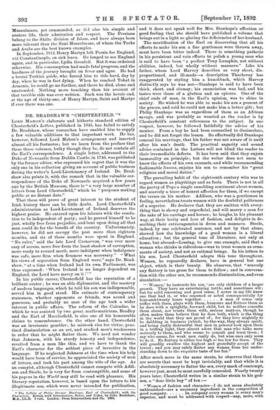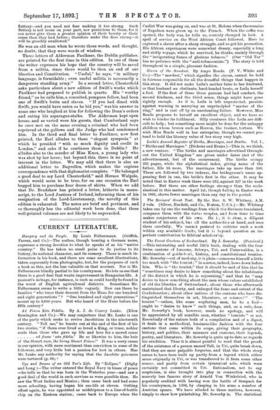DR. BRA.DSHAW'S " CHESTERFIELD."*
LORD MAHorr's elaborate and hitherto standard edition of Chesterfield's Letters, published in 1845, has failed to satisfy
Dr. Bradshaw, whose researches have enabled him to supply a few valuable additions to that important work. He has, however, followed Lord Mahon's arrangement and inserted almost all his footnotes ; but we learn from the preface that these three volumes, bulky though they be, do not contain all the Earl's correspondence. A single letter, addressed to the Duke of Newcastle from Dublin Castle, in 1746, was published by the former editor, who expressed his regret that it was the only one in his collection giving an account of public business during the writer's Lord-Lieutenancy of Ireland. Dr. Brad- shaw also prints it, with the remark that in the valuable cor- respondence of the Duke of Newcastle acquired a few years ago by the British Museum, there is "a very large number of letters from Lord Chesterfield," which he "purposes making public at no distant date."
That these will prove of great interest to the student of Irish history there can be little doubt. Lord Chesterfield's administration as Lord-Lieutenant of Ireland deserves the highest praise. He entered upon his labours with the resolu- tion to be independent of party ; and he proved himself to be just, wholly free from prejudice, and bent upon doing all that man could do for the benefit of the country. Unfortunately, however, he did not occupy the post more than eighteen months, and six of these months were spent in England. "No ruler," said the late Lord Carnarvon, "was ever more easy of access, more free from the least shadow of corruption, more ready to reward merit, more indulgent when indulgence was safe, more firm when firmness was necessary." "What his views of separation from England were," says Dr. Brad- shaw, "at a time when Ireland had its own Parliament, was thus expressed : 'When Ireland is no longer dependent on England, the Lord have mercy on it !' " In his public career, Chesterfield has the reputation of a brilliant orator ; be was an able diplomatist, and the mastery of modern languages, which he told his son was indispensable, served him in good stead. His estimate of contemporary statesmen, whether opponents or friends, was sound and generous, and probably no man of the age took a wider interest in public affairs. The reform of the Calendar, in which he was assisted by two great mathematicians, Bradley and the Earl of Macclesfield, is also one of his honourable claims to remembrance. On the other hand, Chesterfield was an inveterate gambler ; he mistook vice for virtue, prac- tised dissimulation as an art, and studied men's weaknesses in order that he might flatter them. We need not wonder that Johnson, with his sturdy honesty and independence, revolted from a man like this, and we have to thank the Earl's character for the noblest piece of invective in the language. If he neglected Johnson at the time when his help would have been of service, he appreciated the society of men of letters, and took his part among the wits of the age. As an essayist, although Chesterfield cannot compete with Addi- son and Steele, he is very far from contemptible, and some of his papers in the World may still be read with pleasure. His literary reputation, however, is based upon the letters to his illegitimate son, which were never intended for publication,
• The Letters of Philip Dormer Stanhope, Earl of Chesterfield ; with the Characters. Edited, with Introduction, Notes, and Index, by John Bradshaw, M.A., LL.D. S vols. London : Swan Sonnenschein and Co. 1892. and it does not speak well for Mrs. Stanhope's affection or good feeling that she should have published a volume that
brings out in a light so glaring the deficiencies of her.husband. The mortification of the Earl on discovering that all his efforts to make his son a fine gentleman were thrown away, must have been bitter indeed. There is something pathetic in his persistent and vain efforts to polish a young man who is said to have been "a perfect Tony Lumpkin, not without abilities, indeed, but wholly without manners." Like his father, whom Lord Harvey describes as very short, dis- proportioned, and ill-made—a description Thackeray has exaggerated by styling him a hunchback, which Harvey distinctly says he was not—Stanhope is said to have been thick, short, and clumsy; his enunciation was bad, and his tastes were those of a glutton and an epicure. One of the chief ends of man, in the Earl's opinion, was to shine in society. He wished he was able to make his son a present of the graces, and said he could not make him a better gift ; but Philip Stanhope was as regardless of them as an African savage, and was probably as wearied as the reader is by Chesterfield's constant references to the subject. In one respect, however, he followed faithfully the advice of his mentor. From a boy he had been counselled to dissimulate, and he did not forget the lesson. So effectually did Stanhope conceal his marriage, that his father was not aware of it until after his son's death. The practical sagacity and sound advice contained in the Letters will not blind the reader to their irremediable defects. It has been said that they enjoin immorality . on principle ; but the writer does not seem to know the effects of his own counsels, and while recommending fashionable liasons, enjoins his son to remember his "great religious and moral duties."
The prevailing habit of the eighteenth century wits was to regard women as playthings and as fools. There is not in all the poetry of Pope a single ennobling sentiment about women, and scarcely a trace of honest affection for them, if we except the verses on his mother. Addison, who was a gentleman in feeling, nevertheless treats women with the doubtful politeness of a superior. He declares that they are smitten with every- thing that is showy and superficial, and will marry a man for the sake of his carriage and horses ; he laughs, in his pleasant way, at their levity and love of fashion, and delights in de- scribing their extravagancies in dress and manners. Steele, indeed, by one celebrated sentence, and not by that alone, showed how the knowledge of a good woman is a liberal education ; but the general tone of literature, not only at home, but abroad—Lessing, to give one example, said that a woman who thinks is ridiculous—was to treat women as orna- ments of society, and not as rational beings. In his letters to his son, Lord Chesterfield adopts this tone throughout.
Women, he repeatedly declares, have in general but one object, which is their beauty. He observes, that "scarcely any flattery is too gross for them to follow ; and in conversa- tion with the other sex, he recommends dissimulation, and even simulation :—
"'Women,' he instructs his son, are only children of a larger growth. They have an entertaining tattle, and sometimes wit ; but for solid reasoning and good sense, I never in my life knew one that had it, or who reasoned or acted consequentially for four-and-twenty hours together A man of sense only trifles with them, plays with them, humours and flatters them as he does with a sprightly, forward child, but he neither consults them about, nor trusts them with, serious matters, though he often makes them believe that he does both, which is the thing in the world that they are proud of ; for they love mightily to be dabbling in business (which, by-the-way, they always spoil), and being justly distrustful that men in general look upon them in a trifling light, they almost adore that man who talks more seriously to them, and who seems to consult and trust them ; I say who seems, for weak men really do, but wise ones only seem to do it. No flattery is either too high or too low for them. They will greedily swallow the highest and gratefully accept of the lowest ; and you may safely flatter any woman from her under- standing down to the exquisite taste of her fan."
After much more in the same strain, he observes that these are secrets that must be kept inviolably, and that while it is absolutely necessary to flatter the sex, every mark of contempt, however just, must be most carefully concealed. Nearly twenty years later, Chesterfield writes in a similar strain to his god- son, a "dear little boy" of ten :—
"Women of fashion and character—I do not mean absolutely unblemished—are a necessary ingredient in the composition of good company in company every woman is every man. 's superior, and must be addressed with respect—nay, more, with
flattery—and you need not fear making it too strong. Such flattery is not mean on your part, nor pernicious to them, for it can never give them a greater opinion of their beauty or their sense than they had before ; therefore make the dose strong—it will be greedily swallowed."
He was an old man when he wrote these words, and thought, no doubt, that they were words of wisdom.
Three letters of Alderman Faulkner, the Dublin publisher, are printed for the first time in this edition. In one of them the writer expresses his hope that the country will be saved from a militia, since there would be then an end of our liberties and Constitution. "Useful," he says, "in military language, is formidable ; even useful militia is necessarily a dangerous standing army." In a second letter, Chesterfield asks particulars about a new edition of Swift's works which Faulkner had proposed to publish in quarto. His "worthy friend," as he calls him, a conceited, pompous fellow, had been one of Swift's butts and slaves. "If you had dined with Swift, you would have eaten as he bid you," was his answer to some one who laughed at him for following the Dean's orders and eating his asparagus-stalks. The Alderman kept open house, and so varied were his guests, that Cumberland says he once met on the same evening a criminal who had been reprieved at the gallows and the Judge who had condemned him. In the third and final letter to Faulkner, now first printed, the Earl alludes to these "elegant symposia" at which he presided "with so much dignity and credit in Lnidon," and asks if he continues them in Dublin ? He alludes also to the murder of Miss Knox, a young lady who was shot by her lover; but beyond this, there is no point of interest in the letter. We may add that there is also an additional letter to Dayrolles, which makes the copious correspondence with that diplomatist complete. "He belonged a good deal to my Lord Chesterfield," said Horace Walpole, which would seem to be true, for on one occasion the Earl begged him to purchase four dozen of shirts. When we add that Dr. Bradshaw has printed a letter, hitherto in manu- script, to the Lord Justices of Ireland, informing them of his resignation of the Lord-Lieutenancy, the novelty of this edition is exhausted. The notes are brief and pertinent, and so thoroughly has the editorial work been done, that these well-printed volumes are not likely to be superseded.



































 Previous page
Previous page